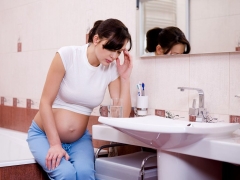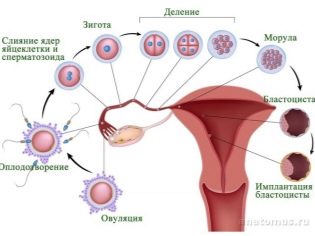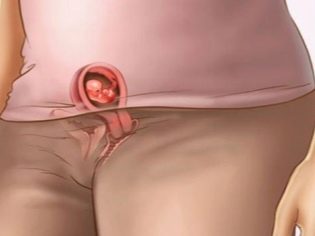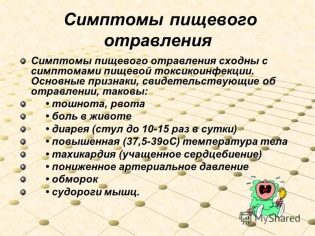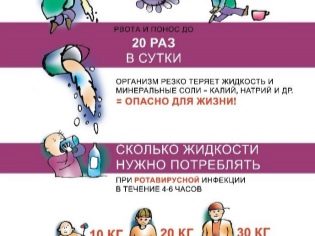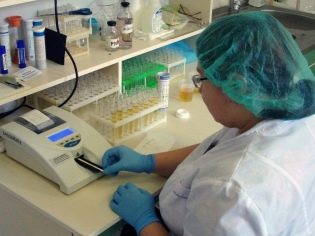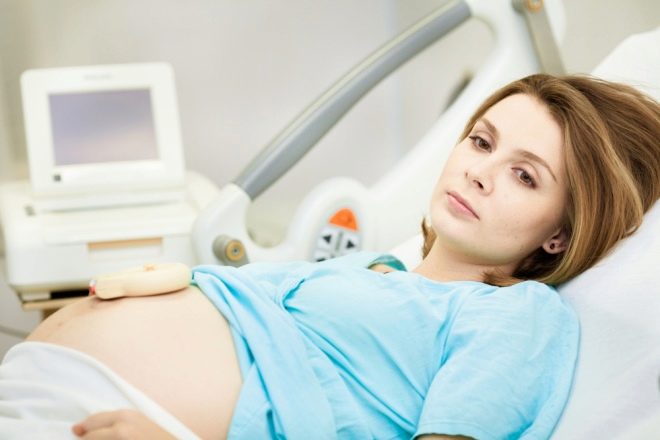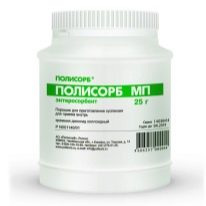When nausea occurs most often during pregnancy, why does this happen and what to do?
Nausea is one of the most common symptoms of early toxicosis during pregnancy. A woman can get sick without vomiting, with vomiting and accompanying additional troubles - diarrhea, flatulence, dizziness and even fainting. However, nausea is not a mandatory sign of pregnancy.. Let us consider in more detail why pregnant women feel sick, and what to do to alleviate their condition.
Why sick?
Toxicosis is a very complex and multi-step process associated with the adaptation of the body of the future mother to the new conditions of existence. After fertilization has taken place successfully, the hormonal background begins to change, so that all the organs and systems of the woman can be rearranged under the onset of pregnancy.
Changes begin at the level of the brain. A few days after conception, it forms a special temporary center of pregnancy, which should keep under control all the processes associated with the bearing of offspring. His hard work and leads to disruption of the functioning of other centers of the cerebral cortex. The center, which is responsible for the production of saliva, for example, begins to poorly control the amount of this same saliva, and the expectant mother has spontaneous drooling in her sleep. The work of the center of the cortex, which is responsible for the motility of the vessels, changes. “Rebellious” and vomiting center, it becomes more active, because of this, and nausea.
The symptom itself is often associated with abnormal manifestations of the work of other brain centers - nausea can occur in response to certain smells that begin to seem horrible and unpleasant, although earlier the nausea body of the future mother may react to certain types of food that used to be fun.
According to the existing statistics, about 75% of pregnant women experience nausea in the early stages. But there are those who only read about nausea or heard from friends. Its absence is an absolute norm, which means that the adaptive abilities of the female body are high. In other words, all organs and systems, and in the first place - the immunity, were able to fairly quickly accept the new living conditions. Therefore, intoxication does not occur, there is also no “conflict” between the brain centers.
By itself, nausea is not dangerous, doctors consider it only in conjunction with other manifestations of toxemia.
In some situations (not always) the woman needs hospitalization and treatment, but most expectant mothers do not need medical intervention, nausea will stop as soon as the body can fully adapt.
When does it start to feel sick?
One should not think that sickness can begin as early as the second day after conception - the mechanism of the occurrence of an unpleasant symptom does not proceed so quickly and is largely connected with other processes. The fertilized egg is still moving for about a week through the fallopian tubes to get into the uterus and settle there for the next nine calendar months. During this week there should be no nausea, because the center of pregnancy in the cerebral cortex has not yet begun to function. The body will perceive pregnancy as an accomplished fact only after the blastocyst is successfully attached in the uterine cavity, and this usually happens 8–9 days after ovulation.
From this moment begins the production of other hormones by the chorion, which are necessary for the preservation and development of the embryo. It was then that the first large-scale changes and metamorphosis in the female body began. Sometimes nausea can appear even before the delay, about a week after conception. Especially sensitive women begin to feel sick 10-14 days after conception. But most often the unpleasant feelings appear on the period of 6-8 weeks of pregnancy.
The most severe nausea is observed up to 10-12 weeks. By this time, the body usually has time to adapt, a young placenta is formed, which takes over the functions of the production of many hormones, and the condition of the pregnant woman usually decreases to 13-14 weeks of gestation, nausea disappears, and toxicosis ends.
Much less often, nausea is manifested at obstetric week 11 and later, it can last up to 16-18 weeks. If in the first month there were no unpleasant symptoms, this does not mean that they will not be later, but this probability decreases with increasing gestational age. Morning nausea is hardest, since the level of glucose in the blood of a pregnant woman decreases during the night. But there is also nighttime nausea, which prevents sleep, as well as occasional seizures that can occur at any time of the day.
How to distinguish from diseases?
By itself, a symptom can accompany not only the process of a woman’s immune adaptation to her own child, but also certain diseases. It is important to be able to distinguish such nausea from toxicosis.
In future mothers, the immune system weakens, artificially suppressed by hormones, and therefore the exacerbation of chronic diseases that the future mother previously suffered is not excluded. If earlier there was gastritis or problems with the pancreas, it was in the early stages that the manifestation of these problems with all the relevant symptoms was not excluded.
If nausea began suddenly, accompanied by diarrhea and headache, muscle pain and fever, most likely it is a rotavirus infection from which no one is immune. A severe vomiting with pain in the stomach, abdominal cramps without fever may indicate food poisoning.
If nausea occurs only from something specific (for example, from sweet or meat products), then the case is in toxicosis - it is very selective. And also, the symptoms of gestational toxicosis most often make themselves felt in the morning and before bedtime, while painful nausea occurs at any time of the day. Nausea in case of illness or poisoning brings temporary relief. In pregnancy, a woman rarely experiences significant relief after vomiting.
But only the doctors who prescribe laboratory tests of the woman’s blood and urine and can say with certainty what causes her nausea, how serious the degree of toxicosis is, and whether the expectant mother needs special treatment can determine the exact cause of what is happening.
Diagnostics
If it appeared nausea at an early stage of pregnancy, do not dramatize the situation. In most cases, it is enough just to be patient and wait for the end of the first trimester. The search for the cause usually does not give any result - in the "pregnant" nausea the whole complexes of internal factors are to blame, and the external ones - smells, tastes and the weather - only the tip of the iceberg.
If nausea in the literal sense of the word interferes with life, the woman should report this to the doctor. To understand whether to treat toxicosis, it is important to know what kind of toxicosis occurred in a particular woman.
In case of toxemia of the first degree, vomiting does not occur more often 4 times a day and usually after eating. A woman can lose up to 4 kilograms of weight, but her skin remains elastic, moist mucous, and her blood pressure and pulse remain normal.This form of nausea does not pose any danger to the mother or the baby, treatment is not required.
If a pregnant woman is sick and often vomiting is repeated up to 8 times a day, doctors talk about severe toxemia. Urine tests show the presence of acetone in the fluid excreted by the kidneys, and an unpleasant smell from the mouth appears. The pressure in a woman often decreases, and the pulse becomes more frequent and uneven. With such nausea, a woman can lose up to 6-8 kilograms in weight. Without the help of doctors with such nausea can not cope.
With third-degree gestational toxicosis, nausea is not the worst. Vomiting can occur up to 15 times a day, all the symptoms of dehydration are present, weight loss exceeds 8 kilograms. The skin of the woman is dry, she is constantly thirsty. The pressure is low, the pulse is very frequent. In the urine, acetone and protein show tests, and blood coagulation factors change.
Without medical care and treatment there is a risk of losing pregnancy, the death of the woman herself.
The reasons
No one, even the most experienced doctor, can answer with confidence the question why nausea appears, because there are many factors, and not all of them are known to science. However, doctors noted that the following categories of expectant mothers usually complain about nausea in particular and toxicosis in general:
- too young (under 18) and “age” (after 35);
- suffering from chronic kidney disease, endocrine system;
- pregnant again after carrying firstborn on the background of toxicosis;
- suffering from gynecological diseases;
- smokers and drinkers;
- recently relocated - moved to another region with a different climate;
- suffering from anemia.
Doctors drew attention to the fact that often pregnant women in early periods feel sick and sickened simply because their mothers or close blood relatives had become pregnant in the same way - the tendency to toxicosis was inherited.
Why is there no toxicosis?
In the people it is believed that nausea must necessarily accompany the "interesting position." But the truth is that this is not true. On the contrary, the absence of toxicosis is quite normal, it says that a woman has no chronic diseases, no pathologies of an immune or endocrine nature. Lack of nausea is a great opportunity to enjoy the early stages of your pregnancy, when it is still easy, movements are not limited, there is no ban on sex and travel. This can and should be used. When a pregnant woman is not sick, her baby receives more nutrients and vitamins, oxygen, his development is more correct and harmonious.
What matters is not so much whether there is nausea, but how it manifests itself. If toxicosis was and worried about the pregnant woman, and then suddenly stopped nauseous, and the gestational age had not yet exceeded the 12-week mark, then it is better to consult a doctor, because often, a non-developing pregnancy makes itself felt that way.
If nausea suddenly intensified, the state and well-being of the pregnant woman became noticeably worse, urgent medical consultation is also needed - the development of pregnancy complications is possible.
Treatment
With severe toxicosis, a woman can take a sick leave. This should be sure to know and do not hesitate to ask the doctor if this is necessary. You can stay at home with a moderate degree of toxemia, if nausea and vomiting are threatening, a woman is hospitalized in a gynecological hospital.
To relieve symptoms, eliminate frequent vomiting, antipsychotics are used that can suppress the activity of the emetic center, for example, "Droperidol". Additionally designate "Relanium», «Zeercal". Attacks of nausea and vomiting are significantly reduced, especially if the drugs are administered intravenously or drip. To eliminate the symptoms of dehydration, oral rehydration preparations are recommended - “Regidron"," Smektu ".In a hospital setting, intravenous saline with vitamins is injected.
For severe nausea, vitamins C, B groups, and enterosorbents are especially helpful. Activated carbon, «Polysorb"And"Enterosgel". In rare cases, in a serious condition of a pregnant woman, hormones have to be used to relieve - “Prednisolone". With severe nausea, doctors recommend antihistamines, which are usually taken for allergies - "Suprastin, Diprazin, Erius. In addition, at the same time women are recommended calcium supplements, excessive drinking and bed rest.
If the treatment is unsuccessful, the condition of the woman remains threatening, it is recommended to terminate the pregnancy for medical reasons. But this happens infrequently, and only when severe prolonged vomiting threatens liver and kidney dystrophy.
Homeopathy with nausea in pregnant women is developed quite widely. There are many drugs that are positioned by manufacturers as effective ("Nux vomika-Gomakkord", "Cocculus indicus" and others). In fact, clinical trials of these drugs have not passed and do not possess efficacy. According to the main rule of homeopathy, they consist of only an insignificant, negligible amount of active ingredients and a large amount of sugar, starch and other dummies - fillers.
If nausea is severe, then one should not expect relief from such remedies. You need a traditional drug treatment under the supervision of a physician.
Folk remedies
For mild nausea, which does not need medication, the expectant mother may well resort to traditional medicine recipes, but it is recommended that you first consult your doctor so as not to harm yourself and your baby.
One of the most famous ways to beat nausea is aromatherapy. If a few drops of mint essential oil are dropped on the wrist or a napkin and placed nearby, the nausea attack will quickly pass. A small amount of ginger oil is applied to the palms and ground, and then hands are brought to the face and inhaled. This method helps to cope with nighttime nausea or nausea after eating.
To reduce attacks, you can also use the essential oils of fir, pine, eucalyptus. However, before use, you should make sure that the future mother is not allergic to these substances.
Herbs will come to the aid of the pregnant woman. Mint tea helps with nausea in the morning, and a pregnant woman can take a bottle of clean drinking water with a spoonful of lemon juice to work or go to university to study. You can cope with nausea with the help of dogrose broth, and with the help of sour cranberry juice, cooked on your own without sugar.
Among the herbs - pregnant maids - oregano, calendula flowers, lemon balm and plakun-grass. With chamomile, so popular in the people, during pregnancy should be more careful, its use in large doses is highly undesirable.
Caution is also needed in the use of bee products - honey gives strength and improves health when nausea, but can be a strong allergen.
How to eat?
Nutrition is associated with many misconceptions. Many pregnant women believe that when nausea does not need to eat, and that the food will only provoke another attack of vomiting. This opinion is erroneous, as is the opinion that when nausea you only need to eat something that does not cause an unpleasant reaction. Any irregularities in the balance of nutrients can adversely affect the development of the fetus, because in the early stages the fetus especially needs to receive all the groups of vitamins and minerals in full.
If a woman is sick of a certain food group, for example, from meat, then you should definitely find an alternative - eat fish, poultry, seafood. With nausea on dairy products, it is necessary to introduce eggs and calcium preparations into the diet. If sickened by the smell and type of cabbage, you need to cook zucchini and pumpkin.
When vomiting can not deny yourself a little salt - it helps to restore the mineral balance.
If pregnancy proceeds without toxemia, salinity and pickled vegetables are usually not recommended, but for a woman who is sick, slight relief is allowed. A few cucumbers or a piece of salted fish will only benefit. Completely avoid carbonated drinks, store juices in packs, canned food, smoked fish and sausages, sausages.
It is advisable to plan your menu on the basis of vegetables and fruits, cereal, stewed, boiled, steamed meat, poultry, fish. Instead of candies and nuts, which are considered to be salutary in case of nausea in pregnant women, it is better to eat croutons from white bread, provided that you made them yourself in the oven without salt, spices and preservatives.
If you are very sick, you must eat soups.
The daily amount of food should be divided into 5-6 receptions to consume at a time a small amount of food that the stomach can hold and digest.
Useful tips
Coping with nausea early in pregnancy to reduce discomfort will help some important and simple recommendations.
- Get up in the morning right. The rise itself should be gradual, unsharp. In order not to be late, it is better to set the alarm in “stock” in 15-20 minutes. Near the bed at arm's length you need to have a small vase or a plate of dried fruits, crackers. They will help to cope with the first morning attack of nausea.
- Down with bad smells! Avoid smoky, stuffy, crowded rooms. Do not try your luck, trying to drive in a crowded bus during rush hours with smells of sweat and fumes that are necessary for such a situation. Do not be zealous with perfume and insist on asking your loved ones. Wherever you go, take a wet wipe, a bottle of water.
- Walk on foot. If you are sick of smells and food, it is better to replace a trip on the subway or bus for a walk. The main thing is to run your route away from the dusty roads, smoky factory pipes.
- Do not forget about the rest. In the daytime, a woman should rest at any convenient time, a daytime sleep is useful, at least for about an hour. But in the evening after eating it is better to wait a couple of hours before bedtime - this pause can be used to go for a walk.
- Air the room. This applies to your own apartment, and workplace. Constant access to fresh air is a key to improving well-being.
In addition, expectant mothers are advised to remember that nausea and toxicosis, like all other ailments and ailments, have very specific psychosomatic causes. Often, toxicosis accompanies unwanted pregnancy. If a woman is afraid, she is not confident in her partner, in herself, in the financial well-being of the family, nausea happens more often. Stay with a good mood and love your baby in the earliest terms.
You will learn more about when nausea during pregnancy appears in the following video.
